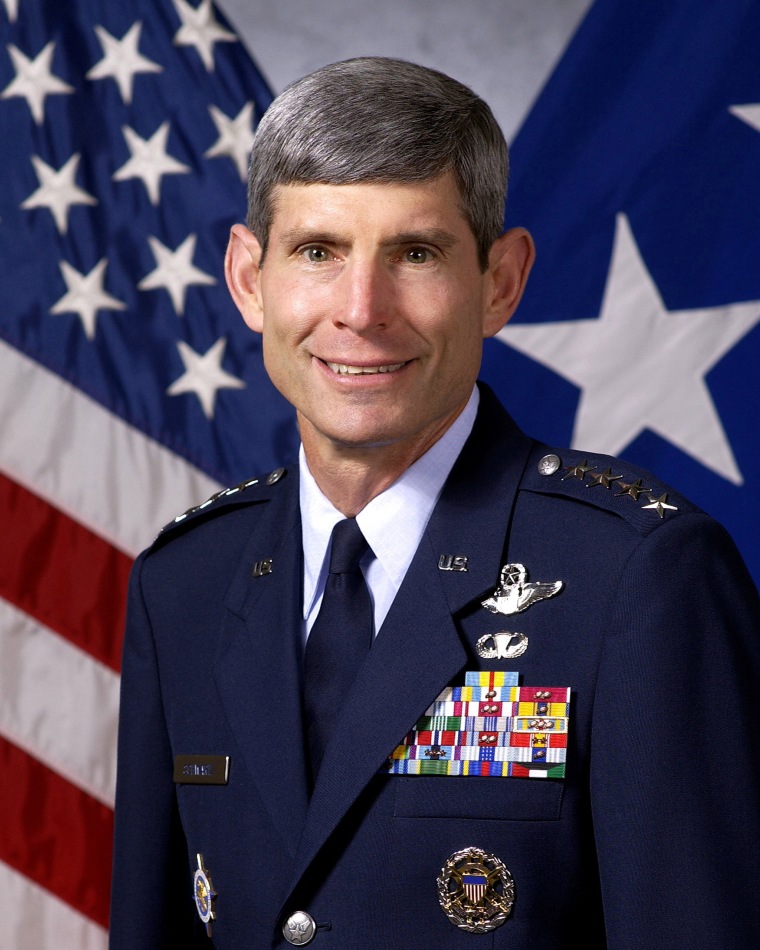Defense Secretary Robert Gates recommended Monday that Gen. Norton Schwartz, a 35-year veteran with a background in U.S. Air Force special operations, be the next Air Force chief.
In a sweeping shake up of the Air Force, Gates also formally sent former Air Force official Michael Donley's name to the White House to be the next secretary of the beleaguered service. President George W. Bush quickly announced he would nominate Donley, and designated him as acting secretary until he is confirmed by the Senate.
After making his announcement, Gates flew to Langley Air Force Base in Virginia and told an audience of several hundred airmen and Air Force civilians that he felt obliged to spell out his reasons for making the changes, which he said might reverberate throughout the Air Force for some years to come.
He praised Wynne and Moseley and predicted that Donley and Schwartz would make positive contributions.
He cited Schwartz's "unique set of experiences and accomplishments."
Last week's removals
Gates announced last Thursday that he was removing Air Force Gen. Michael Moseley from the chief's job and Michael Wynne as its top civilian. Gates held them accountable for failing to fully correct an erosion of nuclear-related performance standards, a concern linked to the cross-country flight last August of a B-52 carrying armed nuclear weapons.
In an effort to get at least part of the new team in place right away, Gates also asked Bush to designate Donley as the acting secretary effective June 21 — a move that would allow him to begin work without waiting for Senate confirmation. Wynne's resignation is effective that day.
Schwartz had been thought to be in line for retirement, and his replacement as head of Transportation Command, Lt. Gen. William Fraser III, had been announced in April. But on Monday Gates recommended that Fraser be nominated as the next vice chief of the Air Force.
And he said Gen. Duncan McNabb, the current vice chief, should move to the Transportation Command job.
On Tuesday, Gates plans to make similar speeches at Peterson Air Force Base, Colo., home of Air Force Space Command, which has responsibility for the service's nuclear intercontinental ballistic missile force, and at Scott Air Force Base, Ill., home of Air Mobility Command, whose tanker refueling aircraft are part of the nuclear bomber mission.
When he announced last Thursday that he was firing Wynne and Moseley, Gates expressed disappointment that shortcomings in the Air Force's handling of its nuclear mission had been allowed to persist.
"I believed that we needed a change of leadership to bring a new perspective and to especially underscore the importance of accountability in dealing with these kinds of problems," Gates told reporters Thursday.
He said at the time that his decision was based mainly on the damning conclusions of an internal report on the mistaken shipment to Taiwan of four Air Force fusing devices for ballistic missile nuclear warheads. And he linked the underlying causes of that slip-up to another startling incident: the North Dakota-to-Louisiana flight last August of a B-52 bomber that was mistakenly armed with six nuclear-tipped cruise missiles.
The report asserted that slippage in the Air Force's nuclear standards was a "problem that has been identified but not effectively addressed for over a decade."
Gates said the Taiwan mistake did not compromise U.S. nuclear weapons technology and did not pose a physical danger, but it "raised questions in the minds of the public as well as internationally."
Choice not 'mainstream'
Tony McPeak, the retired general who was Air Force chief of staff during the first Gulf War in the early 1990s, said in a telephone interview Monday that he welcomed the selections of Schwartz and Donley.
"It's not a mainstream kind of thing" to choose an officer with Schwartz's extensive background in special operations, McPeak said. But Schwartz also has a variety of other experience, including holding senior positions on the Joint Chiefs of Staff. "It's good to have that" broader perspective on the Air Force, said McPeak.
McPeak worked with Donley when Donley was the acting Air Force secretary in the early months of the first Clinton administration in 1993.
"Donley is a solid, solid guy and very experienced," McPeak said.
Donley served as acting secretary of the Air Force for seven months in 1993 and was the service's top financial officer from 1989 to 1993. He is currently the Pentagon's director of administration and management, and has held a variety of strategy and policy positions in government, including a stint on the National Security Council from 1984 to 1989.
Before that he was a member of the Senate Armed Services Committee staff. He served in the Army from 1972 to 1975. He earned bachelors and masters degrees from the University of Southern California.
Schwartz has held several high-level assignments on the Joint Chiefs of Staff, and has been commander of the U.S. Transportation Command since September 2005.
Schwartz, a pilot with more than 4,200 flying hours, served as Commander of the Special Operations Command-Pacific, as well as Alaskan Command, Alaskan North American Aerospace Defense Command Region, and the 11th Air Force. Prior to assuming his current position, Schwartz was Director, the Joint Staff, Washington, D.C.
He attended the Air Force Academy and the National War College, and he participated as a crew member in the 1975 airlift evacuation of Saigon. In 1991, he served as chief of staff of the Joint Special Operations Task Force for Northern Iraq in operations Desert Shield and Desert Storm.
